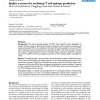Free Online Productivity Tools
i2Speak
i2Symbol
i2OCR
iTex2Img
iWeb2Print
iWeb2Shot
i2Type
iPdf2Split
iPdf2Merge
i2Bopomofo
i2Arabic
i2Style
i2Image
i2PDF
iLatex2Rtf
Sci2ools
BMCBI
2006
2006
EpiJen: a server for multistep T cell epitope prediction
Background: The main processing pathway for MHC class I ligands involves degradation of proteins by the proteasome, followed by transport of products by the transporter associated with antigen processing (TAP) to the endoplasmic reticulum (ER), where peptides are bound by MHC class I molecules, and then presented on the cell surface by MHCs. The whole process is modeled here using an integrated approach, which we call EpiJen. EpiJen is based on quantitative matrices, derived by the additive method, and applied successively to select epitopes. EpiJen is available free online. Results: To identify epitopes, a source protein is passed through four steps: proteasome cleavage, TAP transport, MHC binding and epitope selection. At each stage, different proportions of nonepitopes are eliminated. The final set of peptides represents no more than 5% of the whole protein sequence and will contain 85% of the true epitopes, as indicated by external validation. Compared to other integrated methods ...
BMCBI 2006 | Epitopes | MHC Class | Protein |
| Added | 10 Dec 2010 |
| Updated | 10 Dec 2010 |
| Type | Journal |
| Year | 2006 |
| Where | BMCBI |
| Authors | Irini A. Doytchinova, Pingping Guan, Darren R. Flower |
Comments (0)

